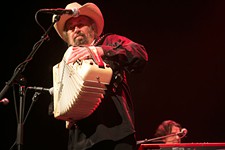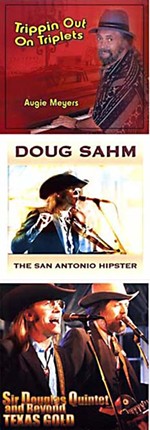High Texas Rider
The saga of Augie Meyers
By Margaret Moser, Fri., Oct. 30, 2009

On the yet-to-be-compiled list of Top 10 All-Time Rock & Roll Keyboard Riffs, Augie Meyers is a lock.
For a musician most notable as a sideman, Meyers boasts a career few can match. Ever since his Vox organ on the Sir Douglas Quintet's "She's About a Mover" branded the 1965 hit with Texas twang to his Grammy-winning work with the Texas Tornados, Meyers has stood on a Hall of Fame lifetime.
If Doug Sahm was what Rolling Stone's Chet Flippo once termed a "walking talking Austin Chamber of Commerce," Meyers is the godfather of San Antonio rock, poster child for staying and playing on the Alamo City's home team in the Texas league – white boy, vato, soul man, musician. His career has crisscrossed cultural boundaries for decades.
Like Sahm, he looms large not only in the musical back pages of San Antonio, but of Austin, San Francisco, Scandinavia, and points in between. His potent stew of rock, blues, country, and conjunto is at once distinct and distinguished. Along the way, he's written songs like "Hey Baby Kep Pa So" that stand as anthems to the nowhere-but-Texas Lone Star attitude.
Start cementing those Top 10.
The English Vox
"I was looking at a magazine in '62 and saw a picture of a Vox. So I went down to San Antonio Music and said, 'I'd like to get one of these.'
"The man said, 'That's from England.' I said, 'Can you get it?'
"About two weeks later he calls me and says: 'I wrote a letter, and they cost $285! Costs close to 300 bucks and they want $60 freight!' I said, 'I want one.'
"He got me the first one in America."
Meyers is perched on a stool in his home office, his trademark braid dangling all the way down his back as he leafs through a scrapbook of memorabilia. He lives with wife Sara Ramirez-Meyers in San Antonio's northern suburbs, not far from her parents. That's a long way from the 87 acres of the Bulverde, Texas, farm he was raised on and inherited from his grandparents. He comes across a yellowed page of blue-lined notebook paper in the scrapbook, crooking a long index finger at a name written in pencil. Mike Smith, it reads, an address and phone number beside it.
"The Dave Clark Five came to town. I opened the show [in the Goldens], and Doug played [with the Markays]. I got offstage and heard in the background, 'The Dave Clark Five aren't going on – their organ is broken.'
"I said to them, 'I have a Vox.'
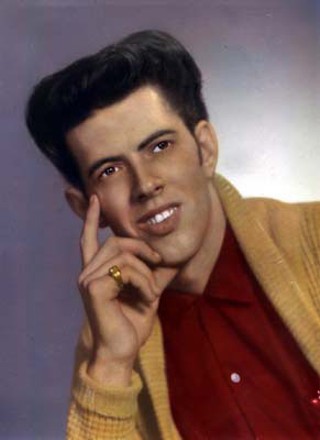
"'But we need an English Vox,' they said. 'I got an English Vox,' I said.
"They came in the dressing room and Mike Smith, the singer, was like, 'He's got a bloody fucking Vox!' They played it, and afterwards I told him, 'Yeah, I'd like to go to England some time,' and he gave me his address and phone number and said, 'You get to England, call me.'"
These days, that encounter would be just another show, but in the mid-1960s, rock concerts were rare events. San Antonio then boasted a thriving rock scene and market that attracted the best package tours and young British acts invading these shores. The Rolling Stones played their second and third shows in the U.S. in San Antonio.
Meyers was already an established player when the Dave Clark Five came to San Antonio. He'd started playing at a young age when a bout with polio kept him at home developing his piano playing, though he of course logged time in his parents' corner store. On one such occasion, he met another 12-year-old similarly inclined to music and already known for his playing. He wouldn't cross paths with Doug Sahm again for several years.
By 1964, Meyers' Vox was pumping for the Goldens. Gigs like this were becoming increasingly more common, plus you never knew who you'd run into at them.
"When Doug was through with his set, Huey Meaux came backstage and said, 'Hey, you got long hair and Doug's got long hair.' I said, 'Yeah, we know each other.' He said, 'Why don't you put a band together and let's knock the shit out the English chart thing?'
"So Doug called a few days later and said, 'Bring your Vox and come to the Blue Note.' I did. A few weeks later, he wrote a song about a couple that used to dance there, called 'She's a Body Mover.' They said you can't put it out; it was too risqué.
"It was late '64. We changed it to 'She's About a Mover.'"
Where Life's Such a Groove
A slightly more colorful version of the Sir Douglas Quintet's origin may be apocryphal but just as memorable. Louisiana producer Huey Meaux, the Crazy Cajun, locked himself in a hotel room with a stack of Beatles records, drinking wine and trying to decipher the secret of the Fab Four's musical appeal. A few bottles later, Meaux decided it was the beat, almost a Cajun two-step. Like Sam Phillips looking for a white boy with a black voice, he set his sights on Sahm and Meyers.
Not only did Meaux successfully mask the Sir Douglas Quintet as Brits, the group sent two hits up the charts with "She's About a Mover" and "The Rains Came." Built respectively on the Beatles' "She's a Woman" and an obscure cover, the songs influenced the young San Antonio Latino rock scene they were born out of, Meyers' organ riffs substituted for old-fashioned accordion. Alongside ? & the Mysterians' "96 Tears" and Sam the Sham & the Pharaohs' "Wooly Bully," Meyers' Vox pumped the sound of the moment. The SDQ went on package tours and played club dates and TV, urged to speak in English accents by Meaux.
"Huey wanted all us to say, 'Sir Doug,' 'Sir August,'" chuckles Meyers. "Trini Lopez is the one who, when we did Hullabaloo, said on television, 'These guys are from my home state of Texas.' Everyone went: 'What? We thought you were English!' The jig was up."
In more ways than one. Revealed as Texans was one thing, being busted was another. A minor pot bust disbanded the Quintet for the first time, and by March 1966, Sahm had headed off to San Francisco.
"When Doug got popped in '65, we couldn't leave Texas for three years," explains Meyers. "I put a band together called Lord August & the Visions of Lite. We cut records and played around Texas.
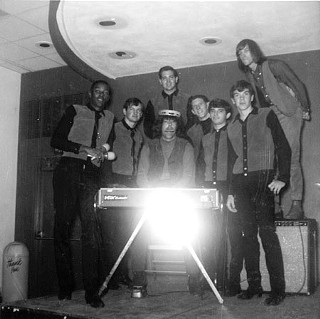
"Huey managed us: 'Y'all gotta dress, look nice. Don't never go out onstage with holes in your tennis shoes and blue jeans and T-shirts with stains on them. People wanna see nice. They don't wanna see what they look like.' So we dressed all the time. At first, Huey said to wear white gloves, so when we went onstage, we'd take our gloves off and throw them out to the audience. After two months, Huey said: 'We've been through 500 pair of gloves, and they cost $2 apiece. No more glove throwing.' We didn't throw no more gloves."
Lord August & the Visions of Lite dominated San Antonio's rock scene from 1966 to 1968, playing clubs like the Pusi-Kat and the Mystic Moor if you were over 18 or the Teen Canteen if you weren't. They dropped the Continental Army-look with the white gloves, growing their hair well past the Beatles style into the nascent hippie look. While playing with local bands such as the Chayns, Cain's Children, and Rocksand, they also opened for touring acts like the Yardbirds.
Texpatriate Sahm, meanwhile, took to the West Coast groove like he'd been born with it. Meyers joined him in California, bringing along Harvey Kagan from the Visions of Lite. Hitting the charts again in 1969 with "Mendocino," the new Quintet was back in business.
Western Heads
As an anthem to the 1960s, "Mendocino" also served as a closing theme to the decade. With Sahm and Meyers teamed again in Jagger-Richards symbiosis, it became clear that "the Quintet" was the two of them and whoever they brought along for the ride, usually a combination of Texan and Bay Area musicians.
"Mendocino" brought with it not only a head-bobbing beat set to Meyers' Vox, but its rootsy aura was a harbinger of progressive country, a sound fostered in the Golden State, Texas, outside Nashville, and anywhere else it could get a foothold.
"[After the Quintet], we'd moved back from California, and Doug said, 'What do you want to do?' I said, 'Why don't you get a bajo [sexto], and I'll get me an accordion, and we'll play conjunto music.' He just said, 'Wow!'
"Because if you really look at 'She's About a Mover,' it's a polka with a rock & roll beat. It's a backbeat. What I'm doing on the Vox organ is what a bajo would do. So he got a bajo, and we started doing stuff."
Their "stuff" caught the attention of Atlantic Records' Jerry Wexler, who brought Sahm and Meyers into the studio for the sessions that became 1973's Doug Sahm and Band. "Band" was an understatement; the lineup included Lone Star pals such as Jack Barber, Atwood Allen, and Flaco Jimenez, plus Dr. John and Bob Dylan, who contributed "Wallflower." It was a glorious recording, a transcendent work that still holds up tougher than ever, making songs such as "(Is Anybody Going to) San Antone" part of the Sahm mythos.
The Atlantic recording at the start of the cosmic cowboy daze and the critical acclaim that came with it bought Meyers the freedom to make his own music in Texas while Sahm bounced between San Antonio, Austin, and the coasts. Meyers, with his first wife, Carol, and son Clay, formed the Western Head Band, country music for hippies who liked to rock.
The Western Head Band headlined weekend nights at Soap Creek and the Opera House in Austin, playing festivals like the Kerrville Folk Festival and opening tours. Western Head Music Co. came out on Polydor in 1971, Meyers going on to record various albums with lineups that included the late Chris Holzhaus, Jack Barber, Mike O'Dowd, and David Zetner. The organist also got into business, starting his own Texas Re-Cord label and recording titles such as You Ain't Rollin' Your Roll Rite.
Yet country wasn't the only change in the 1970s. Around 1977, punk rock reared its Mohawk, and by the time the Sex Pistols plundered Randy's Rodeo in San Antonio the following year, there was no turning the tide. Punk's sharper dressed cousin New Wave then began cherry-picking 1960s garage rock, and one of the primary sounds fleeced was Meyers' keyboard hooks. He nods.
"Willie came in, the Opera House was going, and cosmic cowboys came along, and it changed, but Austin back in the old Soap Creek times, God, those were the days I loved."
Meet Me in Stockholm
Ever the businessman, Doug Sahm saw the punk movement for what it was, a borrowed sound emanating once again from England. He reconvened the Quintet, this time with Speedy Sparks, Alvin Crow, and sometimes young Shawn Sahm. 1981's Border Wave fused Texas groove into the New Wave mold, once again with Meyers' Vox front and center on such songs as a reworking of the Kinks' "Who'll Be the Next in Line" and a prescient cover of the 13th Floor Elevators' "You're Gonna Miss Me."
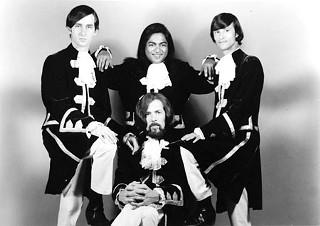
What the 1980s held for Meyers couldn't have been predicted. He and Doug Sahm signed to the Swedish label Sonet, and "Meet Me in Stockholm" became one of the region's biggest chart toppers ever, sending Midnight Sun to platinum heights. Touring Northern Europe proved wildly successful while Meyers took the opportunity to release albums of his own on Sonet: 1982's Still Growin', 1984's August in New York, and 1986's Augie's Back.
My Main Squeeze, however, came out in 1986 on Atlantic and Meyers' new label Super Beet Records. The indie label head got into it with Atlantic Records over distribution and ended up on the phone with Jerry Wexler.
"Jerry said, 'What do you want to do?' Huey Meaux heard about this and called me, 'Whatever you do, brother, get your publishing back.' Jerry said okay.
"I had to buy everything in the warehouse back. They punched a hole in all the album covers. I had to buy 600 records and maybe 7,000 CDs, 400 or 500 45s. Had to go borrow from the bank and refinance my car, but I bought my publishing and my contract back from Atlantic Records. Then Doug called and said, 'Hey, Warner Bros. wants us!' I said. 'I don't want no more from labels.'
"Doug said, 'Let's get Freddy Fender.' I said, 'Let's get Flaco.' We got the four together at Slim's in San Francisco, and that's how the Tornados started. Two shows a night, 500 people standing in line, sold out four shows. Both Atlantic and Warner said, 'Whatever you want.' But they had to really coax me to sign to a major label. I was scared of them, still am."
Down on the Border
The Texas Tornados became the most successful Tex-Mex supergroup ever, winning a Grammy in 1990 for Best Mexican-American Performance for the song "Soy de San Luis" from their self-titled debut. It was a huge victory on both sides of the cultural fence, but especially for Meyers, who'd stayed close to home as Sahm bounced around Europe and Canada. Suddenly, the music they'd known and played all their lives was more than relevant. It was marketable and making money as Zone of Our Own and Hangin' on by a Thread came out in 1991 and 1992, respectively.
"We grew up going to the Westside, where there was Flaco and Mingo Saldivar and Santiago Jimenez," recalls Meyers. "We'd go see them where white people didn't go. We'd be in a club by Spanish guys with dark sunglasses whispering: 'Hey vato! Man, what are you doing here?' 'Just come to see Flaco.' 'What are you looking at?' 'Nothing!' 'You calling me nothing?' Then we get onstage, and after we're through, it was, 'Hey let me buy you a beer!'"
The Tornados' success was liberating, allowing all four stars to play in various combinations as well as solo. Meyers released White Boy in 1995 and in 1996 Alive and Well at Lake Taco, which served as an ersatz greatest hits album that featured his Tornados favorites, "Dinero" and "Hey Baby Kep Pa So." In 1997, Bob Dylan asked him to play on Time Out of Mind, and the next year, the Quintet reinvented itself on Elektra Records with S.D.Q. '98. Life was grand. Then came the phone call from son Clay in November 1999.
"I talked to Doug the day before, told him I was flying to Phoenix with Freddy. He said he was going to Taos, gonna hang out there, maybe buy five acres of land, said he wasn't feeling well. I said: 'Doug, you're manic-depressive with high blood pressure. Go get checked out.' He said: 'Naw, I'm fine. I got a doctor in Frisco.' I said, 'He's a hippie doctor with herbs and health foods.' 'No, man,' Doug said, 'he's cool.'
"But he was up there, in a hot tub, and you don't get in a hot tub with high blood pressure. He got out and called Deborah [Hansen, Doug's girlfriend] around 10 o'clock and said, 'I feel bad.' She said, 'Go to a doctor now.' He said, 'I'm gonna take a few vitamins and go to bed.' She called him an hour later and he didn't answer, called two hours later and he didn't answer. She figured he'd gone to sleep. Next morning she called and he didn't answer.
"She knows he gets up at 7:30 and starts making coffee, smoking a joint. She called the front desk and said to go look. They found him in the room on the floor in his underwear. I hope when he went down he wasn't laying there suffering. I've often thought about that. I turned around, came home to Texas. Freddy stayed on the road.
"It was like learning to walk all over again. When you've been friends with someone since they were 12 years old, all your plans and thoughts go through them and them through you. We talked every day on the phone. Life was totally different when he passed away. I miss him all the time. I'll be honest, I go onstage and I say, 'Doug, be there with me.' And every time I'm there, he's with me.
"Sometimes Shawn calls and says, 'Boogie – he calls me Boogie – what's happening?' Sometimes I stop for a second because he sounds so much like Doug. When he's playing, I close my eyes and the hair on the back of my head goes up and my hands shake. When we're doing a Quintet song, it's just like Doug onstage."
Windblown
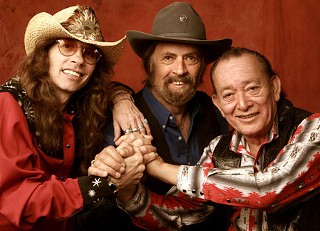
"The thought of playing without Pop, I couldn't fathom."
The anguish in Shawn Sahm's voice is audible.
"Guys like Augie have finesse to their craft and an understanding of the music that allows them to execute it in a way very few people can. Yes, it's two chords and simple, but you can't fake the feeling he gives it. Onstage every night I say how much I love him, and I mean it. If it wasn't for Augie, I don't know how I would have made it through."
The Tornados survived, touring occasionally with Lee Roy Parnell and then Roy Head, until Shawn Sahm stepped in. Without a Sahm, the Tornados missed a fearless frontman. With Shawn, who'd first stood in his father's mighty shadow on the cover of Rolling Stone in 1968, the mojo was back and, early in the new millennium, so were the Tornados. Then Freddy Fender was diagnosed with cancer.
"I was with Freddy at the last shows," says Meyers, speaking softly and looking at a framed photo of the Texas Tornados on the wall.
"Freddy and I were in L.A. at a steak house [New Year's Eve, 2005], and he couldn't finish the last 30 minutes. He said, 'Take over, brother.' I took over the show, 'Happy New Year!' And everybody went home. Next morning, at the airport, I had to get him a wheelchair and get him through Southwest Airlines. The look on his face, he knew he was defeated. 'I think it's over,' he said.
"And it was."
Riding the Highs All Day
Augie Meyers keeps everything. Surrounding the scrapbook page with Mike Smith's note from 1965 are more than the usual show fliers, tickets, contracts, newspaper clippings, and yellowed ads. A page from TV Guide the week the Quintet played Shindig! flashes past as he flips through the book, the group's name underlined in heavy blue ballpoint ink.
His new album, Country, came out at the end of summer, a low-key, beautifully crafted recording displaying the many faces of country music. Like all of Meyers' CDs these days, it's a family affair, his wife, Sara, having designed Country and son Clay playing drums on half the tracks. Listening to his compositions, it's clear that Augie Meyers is a romantic at heart.
"The romantic end of it, yeah, I like that part. I remember years ago when Huey Meaux used to say, 'If you're gonna write songs, write something people can relate to, like being happy or if they're sad why they're being sad.' So I always try to write my songs on that."
Meyers' voice is not a polished one. It's rough and often flats when he sings. It's also distinctive and leather-tough, evocative and alluring, and suits his music much as Neil Young's voice fits his. His compositions glue the Quintet's and Tornados' catalogs, yet one song written in the early 1970s seems to be his personal theme, "High Texas Rider." Its popping bass, wicked guitar, loping beat, and uncomplicated lyrics make it the right candidate: "Well, I'm a high Texas rider, riding the highs all day."
Recently, Meyers was awarded a gold record for the Sir Douglas Quintet's Scandinavian Years, a CD reissue that's gone platinum since the gold record. The news helped alleviate the shock of a routine checkup at the doctor that landed him in intensive care with near kidney failure. That caused him to cancel a September tour and slowed Country's promotion, but daily dialysis at home keeps him going, and a trip to New York to play a tribute to Jerry Wexler is imminent. With the long-awaited new Texas Tornados disc due and a subsequent tour planned, he still has work to do.
So when that list of Top 10 All-Time Rock & Roll Keyboard Riffs gets made, Augie Meyers can take his place among the best. And when a list of Top 10 Texas Rock & Roll Keyboard Riffs is compiled, Augie Meyers will be No. 1.
SDQ2, featuring Augie Meyers and Shawn Sahm, plays a special Doug Sahm Birthday Tribute at Antone's Friday, Nov. 6, alongside Jimmie Vaughan, the Lucky Tomblin Band, Paul Ray & the Cobras, Tortilla Flats, Greezy Wheels, Joe King Carrasco, Ponty Bone, and the Krayolas. The evening also serves as a fundraiser for a marker on Doug Sahm Hill.





